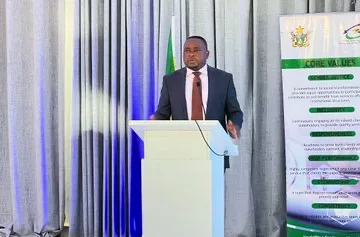|
Getting your Trinity Audio player ready...
|
The Ministry of Skills Audit and Development has encouraged the adoption of skills that adapt to the demands of the digital age, new technologies and aspects of machine learning and artificial intelligence in pursuit of sustainable development.
This emerged at the Jobs for the Future Summit hed under the theme “Shaping Tomorrow’s Workforce: Innovation, Skills and Inclusive Growth for Zimbabwe’s Future Jobs” held at the Gold Conifer Events and Conference Centre in Harare yesterday.
“This meeting calls for us to close our eyes and envision a future beyond our lifespans. The future will only work for those who have plans. One of the mandates of the ministry is to ensure that the country adapts to the digital age, to the new technologies of machine learning, artificial intelligence and all that. How do we adapt without a plan? And this is really for us to understand what is going to happen, understand the different
scenarios and consequences and to prepare for that future that will be coming.
“So we are also looking at how do we become future ready, how do we future proof our institutions, how do we future proof our organizations in terms of planning, in terms of preparation in skills development to prepare for the future? I read somewhere that 69% of the children who are in school today, in primary school, will be employed in jobs that we don’t know, they don’t exist at the moment. So when you bring career guidance to your child and say be a doctor, you are lying because the robot will be the doctor. It won’t be your child. So we need to also look at future proofing, parenting and career guidance to ensure that we begin to help people have a view of the future,” said Ambassador Rudo Chitiga, the Permanent Secretary for the Ministry of Skills Audit and Development.
Ambassador Chitiga alluded to the time of COVID-19 when people were all working from home during the lockdowns. She said such situations led to innovations like people using mobile applications to order food and medicines in the comfort of their homes.
“That’s a new economy that is now taking over. We have a lot of people doing more night work. Many suburban kids now sleep during the day because they work in America virtually. They start working at 6 pm when we will be doing nothing because their offices in America are open around that time. These are new employments that we are not tracking, that we are not looking at. And this gives us an opportunity to look at what is this
that is happening, and how do we track it, how do we keep in touch, and how do we begin to mainstream it in our thoughts. And not just when I grow up, I want to work in an office. We now need to mainstream that and think about that,” she said.
Zimbabwe has many skilled persons and thinkers who must be brought together to develop strategies that work for the country. The role of the ministry is to bring them together, provide a platform, set the problem, help them restate the problem, and then find the solutions that work for the country.
Stakeholders analyzed the impact of global trends on the future of jobs in Zimbabwe and identified the skills and competencies required for the future in different industries or sectors. There were discussions on strategies for upskilling and reskilling by the workforce to meet the demands of the changing labour market.
The workshop also explored some of the innovative approaches to creating decent jobs for inclusive growth.
Hon Prof Paul Mavima, the Minister of Skills Audit and Development, said there is a need for all-stakeholder participation by academic institutions, industry, workers, and development partners, among others, in undertaking a comprehensive skills audit.
“There was a skills audit done in 2018 but there have been demographic shifts, technological innovations, a transition in the economy and geopolitics. All these changes have implications for what we need in order to produce a competitive effect, and be as productive as we can, as mentioned. Again, this comes back to how we develop our human capital in order to succeed.
“We need to bring some of this experience to our work on a regular basis so that we can continue to integrate what we need into our human capital.
There was a recent publication by the World Economic Forum with a focus on the future of jobs. It is the human capital of a country that can transform the country. It is the human capital of a country that can improve productivity in all sectors. It is our thinking capacities that will transform our agriculture from where it is today,” Prof Mavima said.
He urged stakeholders to prepare for the future to effectively participate in the era of rapid change.
“Zimbabwe must embrace innovations including artificial intelligence, robotics, and automation. These technologies are no longer futuristic concepts. They are present-day realities that are transforming the way we live and work. It’s here. My warning is that we are not moving fast enough. We don’t want to be overtaken by other countries like Rwanda or South Africa. Zimbabwe is the number one country as far as educational attainment is concerned.
“Let’s keep abreast of these changes and make sure that we are creating our youngsters to be on top of the situation. We want to go beyond just the consumption of these technologies. Zimbabwe should fully benefit from these technologies. We must position ourselves as the key players in the production and exporting of advanced digital solutions. We must strive to become a hub for the development and manufacturing of artificial intelligence products, applications, robots, and cutting-edge technologies in every sector,” Prof Mavima said.






